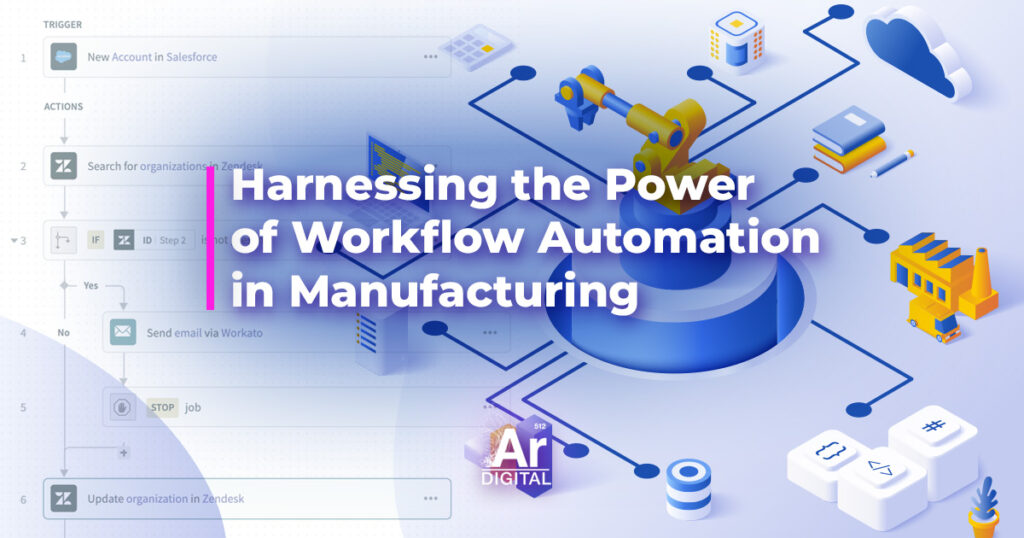Harnessing the Power of Workflow Automation in Manufacturing for Operational Excellence
In the dynamic world of manufacturing, staying ahead in the competitive market requires innovative strategies and efficient operations. Automation software emerges as a game-changer, revolutionizing how manufacturing companies operate. By integrating workflow automation in manufacturing processes, businesses can streamline operations, expedite accounts payable and receivable functions, and significantly enhance the customer experience.
Streamlining Operations with Automation
The Role of Workflow Automation in Manufacturing Efficiency
Automation software in manufacturing operations is more than a technological upgrade; it’s a catalyst for efficiency and productivity. By automating repetitive tasks, companies can reallocate human resources to more strategic initiatives. This shift not only boosts productivity but also fosters a culture of innovation.
Sample Scenario:
Imagine a factory where production schedules are dynamically adjusted in real-time, based on supply chain updates. Automation software enables this level of agility, reducing downtime and enhancing production efficiency.
Accelerating Financial Functions - Accounts Payable and Receivable
Transforming Financial Transactions through Workflow Automation in Manufacturing
The speed and accuracy of financial transactions are crucial in manufacturing. Automation in accounts payable and receivable can drastically reduce the time spent on manual data entry, invoice processing, and payment tracking, leading to improved cash flow management.
Sample Scenario:
Consider a scenario where invoices are processed automatically upon receipt, with AI-driven systems flagging discrepancies. This efficiency not only speeds up the payment cycle but also minimizes errors, improving financial accuracy and reliability.
Improving Customer Experience with Automated Systems
Workflow Automation in Manufacturing as a Customer Satisfaction Tool
In the age of instant gratification, customer expectations are higher than ever. Automation can play a pivotal role in meeting these expectations by ensuring faster response times, personalized communications, and consistent product quality.
Sample Scenario:
Envision a customer portal where clients can track their orders in real-time, powered by automation. This level of transparency and responsiveness significantly boosts customer satisfaction and loyalty.
Additional Benefits that Manufacturers Can Expect from Investing in Automation Software
Improved Resource Management: Workflow automation software helps in the optimal allocation and utilization of resources. This includes better management of raw materials, machinery, and human resources, leading to reduced waste and cost savings.
Enhanced Collaboration and Communication: Automation tools can improve the flow of information across different departments. This enhanced communication facilitates collaboration, ensures everyone is on the same page, and can lead to more innovative solutions and quicker problem-solving.
Customizable Workflows for Specific Needs: Modern automation software often offers customizable workflows that can be tailored to the specific needs of a manufacturing process. This flexibility allows manufacturers to adapt quickly to new challenges or changes in the market.
Reduced Human Error: By automating routine and repetitive tasks, workflow automation software minimizes the chances of human error, which can lead to product defects, delays, and increased costs.
Faster Decision Making: With real-time data and analytics, manufacturers can make more informed decisions quickly. This agility in decision-making can be crucial in responding to market changes or internal challenges.
Better Compliance and Quality Control: Automated workflows ensure that all processes adhere to predefined standards and regulations, which is essential for maintaining quality and compliance in manufacturing operations.
Increased Customer Satisfaction: By streamlining operations and ensuring consistent product quality, manufacturers can meet customer demands more effectively, leading to higher customer satisfaction and loyalty.
Scalability and Growth: Workflow automation software can easily scale with the business, supporting growth without the need for significant additional resources or restructuring.
Employee Empowerment and Skill Development: Automating mundane tasks allows employees to focus on more complex and engaging work, leading to skill development and a more empowered workforce.
Energy Efficiency and Sustainability: Automation software can optimize the use of energy and resources in manufacturing processes, contributing to sustainability efforts and potentially leading to cost savings.
Workflow Automation in Manufacturing is Not Just the Future- It's NOW!
Adopting automation in manufacturing is not just a trend; it’s a strategic move towards operational excellence. By leveraging automation software, companies can enhance their operational efficiency, financial processing speed, and customer satisfaction, positioning themselves for success in a rapidly evolving market.




